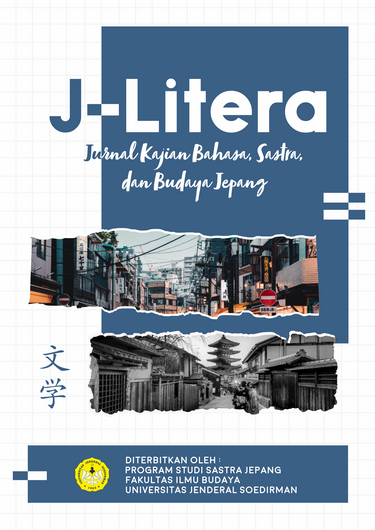Pesan Persahabatan dalam Kumpulan Tanka ‘Midaregami’ Karya Yosano Akiko (Kajian Stilistika Sastra)
Abstract
This study aims to interpret the message about friendship in Yosano Akiko's ‘Midaregami’ tanka collection, focusing on the ‘Shirayuri’ chapter by identifying the use of language style. The stylistic theory used in this study is Keraf’s (2009) and Tarigan’s (2013), while the friendship theory used in this study is Shimizu's (1992) theory. This study used a qualitative descriptive method with a literary stylistics approach. The analysis technique used is syntagmatic content analysis, continued with referential-equivalence and comparison-matching (HBS) techniques. The study results shows that among 36 tankas, 17 tankas in Shirayuri were found to be containing messages about friendship. The language styles found in the tankas are dominated by allusion. Messages about friendship found in the tankas includes accepting friends as who they are, ignoring other people's judgments about our friends, sense of togetherness in simple things, to not break any promises, encouraging our friends to be more courageous in facing problems, trusting our friends' abilities to fight by their own power, preventing our friends from doing reckless and dishonest actions, making our friends aware of the things that they can do on their own, helping friends as hard as they can when they are in trouble, going through difficult times together with friends, having sympathy towards bad things that happened to our friends, the form of sadness and longing when we get separated from our friends, and to maintain friendship by sharing information about each other's daily lives.
References
Beichman, J. (2002). Embracing The Firebird: Yosano Akiko and The Birth of Female Voice in Modern Japanese Poetry. Hawai'i: University of Hawai'i Press.
Hamad, I. (2007, Desember). Lebih Dekat dengan Analisis Wacana. Mediator: Jurnal Komunikasi, 8(2), 325-344.
Ireland, J. (2012). This Tangled, Tangled Translation: Akiko Yosano's Midaregami. Verso: An Undergraduate Journal of Literary Criticism, 1-10.
Ishikawa, M. (2016, Feb 26). About Tanka. (Translated by David Boyd, Penyunt.) Jung Journal, 32-36.
Keraf, G. (2009). Diksi dan Gaya Bahasa. Jakarta: Gramedia.
Morioka, K. (2000). Shueisha Kokugo Jiten, 2nd ed. Japan: Shueisha.
Muntazir. (2017, August 31). Struktur Fisik dan Struktur Batin Pada Puisi Tuhan, Aku Cinta Padamu Karya WS Rendra. PESONA: Jurnal Kajian Bahasa dan Sastra Indonesia, 3(2), 208-223.
Purbani, W. (2010). Metode Penelitian Sastra. Jurnal Universitas Negeri Yogyakarta, 1(1).
Qoumy, J. (2016, April). Penggunaan Metafora dalam Novel Yukiguni Karya Yasunari Kawabata. SAZANAMI, 4(1), 174-183.
Reichhold, J., & Kobayashi, M. (2014). A Girl with Tangled Hair: The 399 Tanka in Midaregami - Tangled Hair by Akiko Yosano. California: AHA Books.
Shimizu, M. (1992). Male and Female American and Japanese Perceptions of Close Friendship. Oregon State University, Interdisciplinary Studies. Oregon: Oregon State University.
Tarigan, H. G. (2013). Pengajaran Gaya Bahasa. Bandung: Penerbit Angkasa.
Yamazaki, H. (2018). "Midaregami"-ron: Yosano Tekkan to Yamakawa Tomiko. 53, hal. 38-55.
Zaim, M. (2014). Metode Penelitian Bahasa: Pendekatan Struktural. Padang: Sukabina Press.
山居. (t.thn.). Kotobank. Dipetik Jan 25, 2022, dari kotobank.jp: https://kotobank.jp/word/%E5%B1%B1%E5%B1%85-513140
山蓼. (t.thn.). Kotobank. Dipetik Jan 25, 2022, dari kotobank.jp: https://kotobank.jp/word/%E5%B1%B1%E8%93%BC-2089586









.png)



